The lupine is soaked
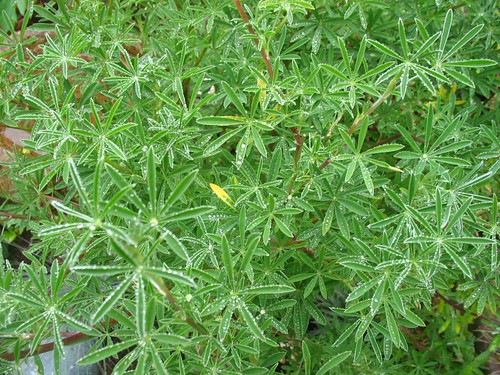
And there's dew on my rue.
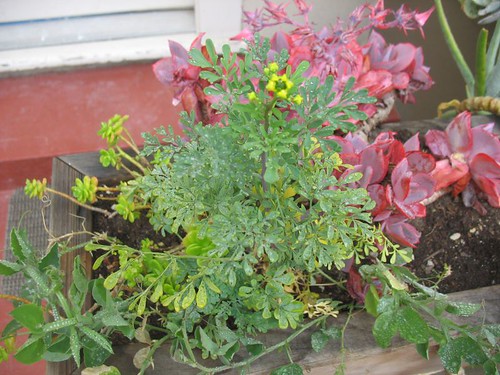
This was at 12:30 p.m. by which time this sort of thing has normally evaporated. In fact, we didn't see the sun at all today in Bernal Heights. This is what happens when hot air in the Central Valley rises and sucks in cool ocean air.
A perfect day to garden.
But terrible for tomatoes. Which is one reason why we grow cherries in San Francisco.
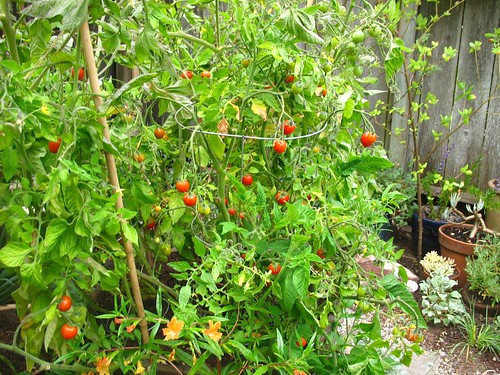
I transplanted Ceanothus 'Ray Hartman' today. (I bought the Ceanothus book recently (after a few glasses of wine at a Botanical Garden members event; I really ought to blog the members events--they're a real hoot--but it would be hard because I really couldn't tell you everything, if you know what I mean).
Anynow, according to the book, 'Ray Hartman' is a cross between C. arboreus and C. thryrsiflorus var. griseus that was first collected in Saratoga, CA. "Howard McMinn was the first to evaluate and distribute [it] and for a brief period in the late 1940s it carried the name 'Blue Sky'...It was [later] named in honor of Ray Hartman for his lifelong interest and advocacy of California native plants." No good links easily available for the horticulturists Hartman, or McMinn (perhaps best known for the cultivar of Arctostaphylos densiflora named for him). 'Ray Hartman' is among the most tree-like cultivar of ceanothus commonly available.
I'd been growing Ceanothus 'Ray Hartman' in this container, which seemed like a reasonable experiment when I started, but, in my opinion wasn't turning out very well. Despite an absolute requirement for well-draining soil, ceanothus don't seem to like containerization, at least in my hands. I don't see any discussion of container culture in the book, but there is a picture of a containerized Ceanothus impressus var. impressus in England on page 71.
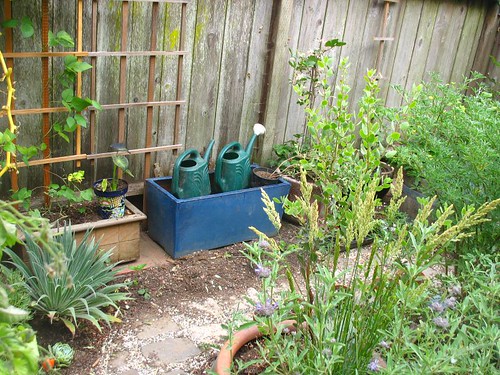
So, I put it in the ground at the end of a path you can't see in this picture.
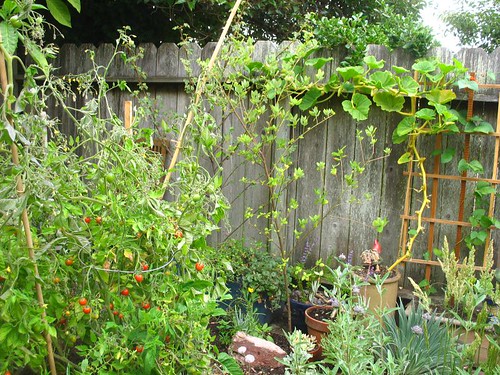
This will be very nice if the transplanting succeeds. But it's right in front of a containerized Fremontodendron'San Gabriel' (doing okay, but not fabulous) that I'm now under serious aesthetic pressure to move.
And look what I found buried in the Ceanothus container!
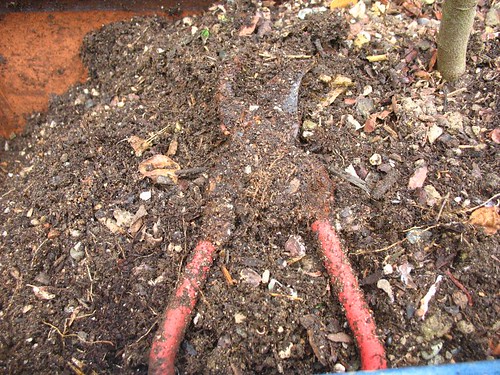
WTF?! How did I do that? Geez! No good way to spin this--I'm careless with my gardening tools!
I had been waiting for the Dip 'N Grow to arrive before I did some much needed pruning. Actually, I waited an inexplicably long time to order the Dip 'N Grow. It arrived four days after I ordered it. Despite giving up four precious Saturday mornings to drive to Los Altos in January for a pruning class (2nd class, 3rd class), I have yet to develop a serious pruning ethic. I get to it when I get to it (but at least I feel confident when I finally get to it).
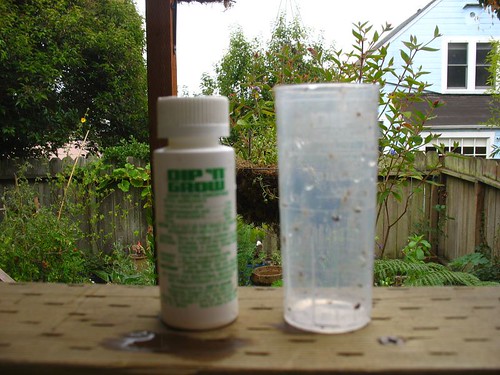
Among my many idiosyncratic gardening angsts, I absolutely cannot prune natives without trying to propagate them.
So, lots of cuttings of Mimulus aurantiacus and Salvia clevelandii 'Alan Chickering', and some tips I took off 'Ray Hartman'.

And I headed back the Tibouchina urvilleana (Princess Plant).
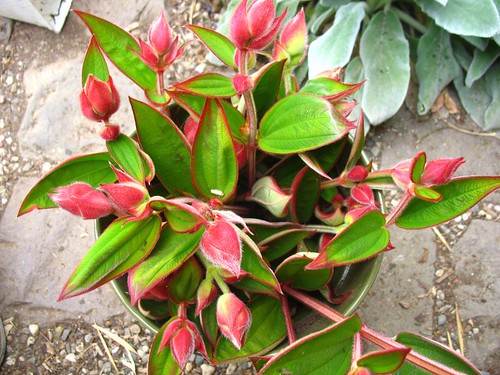
I've decided the best way to prune Princess Plant is to make whatever shaping and thinning cuts are necessary all year long, and then make heading cuts on every central stem before it blooms. These I don't bother to propagate.
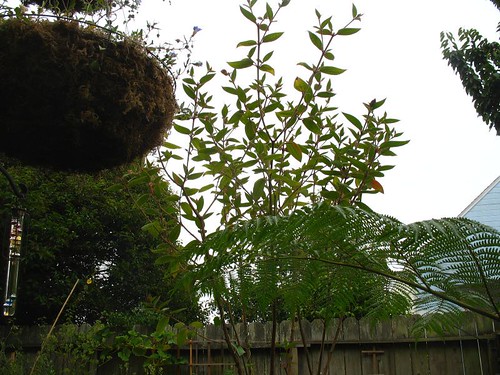
I think it works best in the garden as a multi-trunked small tree.
I potted up some succulent cuttings.
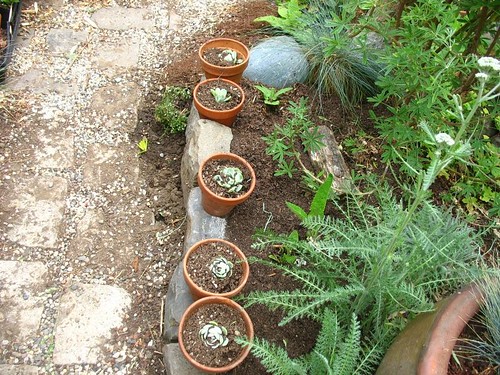
Photographing high contrast is something else I need to work with on my camera (in addition to close-ups).
Datura wrightii

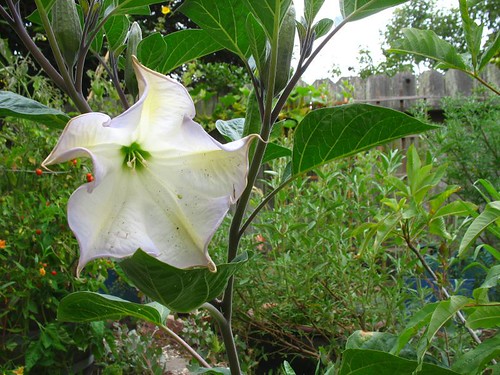
That reminds me, there's a short discussion about Brugmansia vs. Datura in Robert Raabe's Laboratory Report section in the new issue of Pacific Horticulture:
Originally, all angel's trumpets were placed in the genus Datura. They are now divided between the genera Brugmansia and Datura, depending on several factors. Datura are annuals or short-lived perennials with fragrant upright or pendulous flowers, and spiny dehiscent fruits."
Yes, believe it or not, I'm primarily growing this Datura wrightii for the visual interest its spiny seed pod will provide in winter, not the summer flower. But the summer flower is nice too.
"Brugmansia species are shrubs or small trees with pendulous flowers and smooth fruits that do not split at maturity. Both native to the Americas, but questions remain about the origin of some Datura species."
Well, I've been wondering.
I've never seen a Brugmansia fruit--perhaps it's not warm enough to set fruit in No. California.
The 'Kniola Black' turns out not to be all that black. I have a real weakness for morning glory. So I only grow them in containers.
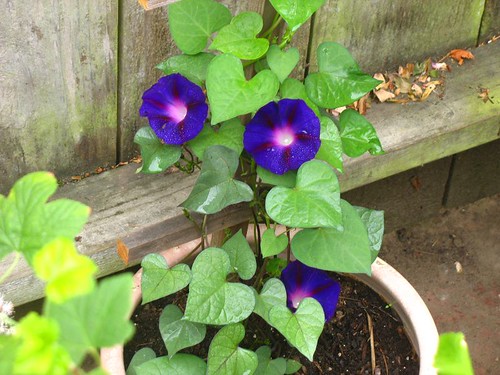
I heart cordate leaves!
Zinnia
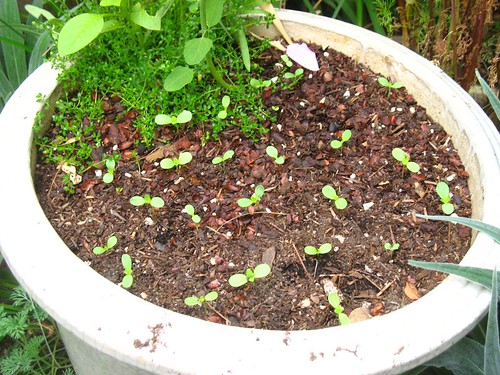
Centaurea (both the regular blue and the really dark blue)
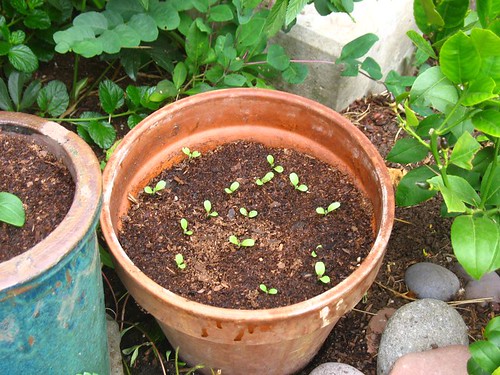
In the container next to the Centaurea seedlings, I planted a a 46-day novelty cucumber, Rocky, that makes 2-3" long fruit.
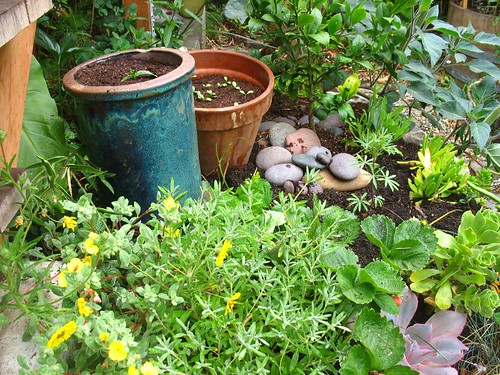
Just for fun, here we are today:
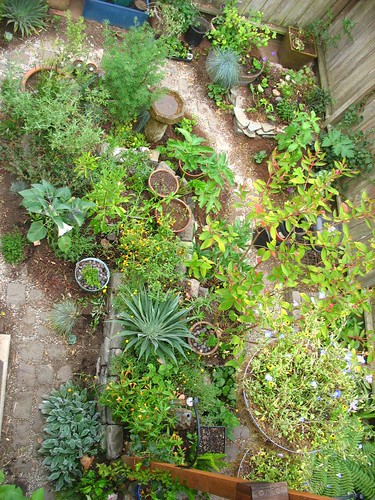
And here we are 20-Nov-05.

I was headed in a totally different direction, not even two years ago. Of course, I didn't have a clue what I was doing. Pretty much everything I know about gardening I've learned in the last year and a half.

5 comments:
Glad you found your pruner, now you can put it to good use after attending your class! I like the comparison between your then and now photos.
For someone who "learned all their gardening in the last year and a half", you certainly have a lot going on.
Were those Felco pruners you buried like that? I hope not!
The gardening bug bit me really hard.
And no, those aren't Felcos, or anything fancy. I know myself too well to spend much $ on tools. But these weren't exactly cheap, either. Almost $20 as I recall.
What excellent progress! Gardening is a journey anyhow, IMO...and I'd say you've come very far (whilst enjoying the view along the way). "Dew on my rue"...hee hee...sorry. ;-)
Post a Comment